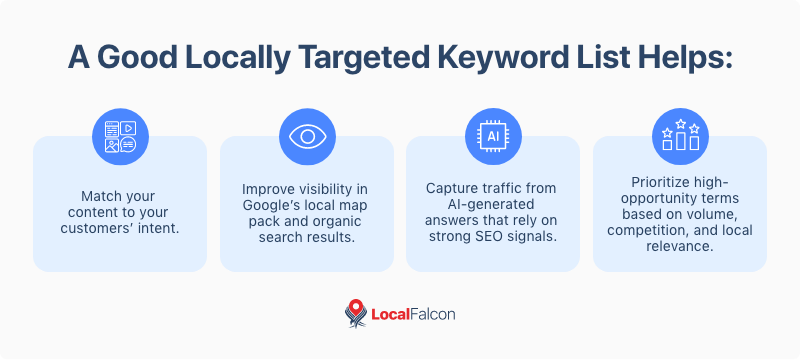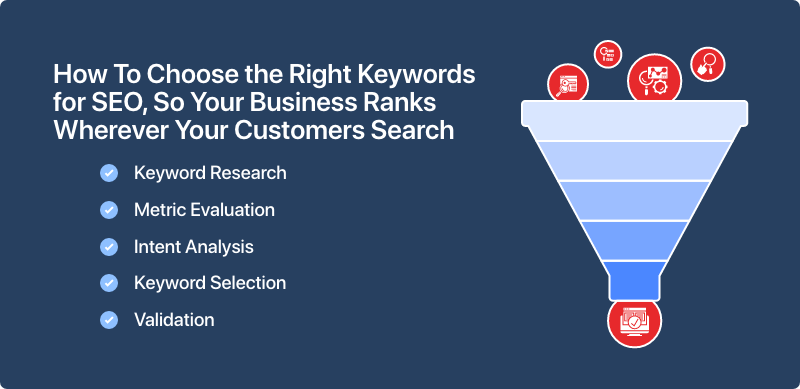When it comes to local SEO, choosing the right keywords to target is one of the most important steps you can take to improve visibility across both traditional and AI-powered search experiences.
Whether your customers are searching on Google, ChatGPT, or any other traditional or AI search engine, understanding how to choose keywords for SEO can help ensure your business shows up everywhere it matters.
In this guide, we'll walk through a proven step-by-step process for choosing SEO keywords that can help your local business rank in traditional local search results and AI-generated answers alike.

What's the Goal of Choosing Keywords for Local SEO?
The goal of choosing keywords for SEO is simple: to identify the specific search terms your potential customers are using, then optimize your content so your business shows up when they search with those terms.
For local businesses, choosing keywords doesn't revolve around ranking for broad industry terms. You need to rank in specific locations, for specific products or services, and in map-based (local pack), organic, and increasingly AI-generated search results alike. Building a strong, diverse keyword list of locally relevant terms to target helps you do that.
A good locally targeted keyword list helps:
- Match your content to your customers' intent.
- Improve visibility in Google's local map pack and organic search results.
- Capture traffic from AI-generated answers that rely on strong SEO signals.
- Prioritize high-opportunity terms based on volume, competition, and local relevance.

How To Choose the Right Keywords for SEO, So Your Business Ranks Wherever Your Customers Search
1. Do Keyword Research To Find Relevant Keyword Ideas
Every strong SEO strategy, local or traditional, starts with keyword research. For local SEO, your goal is to build a list of relevant, location-specific, and intent-driven keywords that reflect what your customers are really looking for.
Using Seed Keywords To Generate Ideas
Start with a few "seed keywords," or basic phrases that describe your service. For example, a landscaping company might begin with terms like "lawn care," "landscape design," or "tree trimming."
From there, use a keyword research tool (like Local Falcon's Local Keyword Tool) to generate longer-tail and more locally relevant variations. These often include geographic modifiers or more specific service descriptions, such as "landscape design [City]" or "tree trimming in [Neighborhood]."
Local Falcon's Local Keyword Tool automatically suggests a seed keyword based on your business location's category to get you started. Then, you can use the AI-generated keyword ideas as additional seed keywords to further refine your keyword list.
Doing Competitor Keyword Analysis
If you're unsure where to start, take a look at what your top competitors are ranking for. You can enter a competitor's website into an SEO tool like Semrush to see what keywords it's ranking for and even compare them to your own to identify gaps.
Choosing Keywords You Already Rank For
Some of the most valuable keywords to optimize for are ones your site already ranks for, but not quite well enough.
Use Google Search Console to find low-visibility terms, such as keywords you're currently ranking for on page two or three of Google. These are prime opportunities, and with a few content improvements, you can often move up the rankings and start capturing significantly more traffic.
2. Look at Keyword Metrics To Evaluate Opportunities
When you're looking at potential SEO keywords, it's important to evaluate them carefully to determine which offer the best opportunities to improve your local rankings.
Keyword Search Volume
Keyword search volume tells you how often a term is searched per month. Higher volume means more potential traffic, but also usually more competition. Keep in mind that local modifiers, like city or neighborhood names, naturally lower the volume, even though they may be more valuable for conversions, so it's important to look beyond volume to evaluate a keyword's potential to drive business.
Keyword Difficulty
Keyword difficulty scores estimate how hard it will be to rank for a given keyword. A higher difficulty means it's harder to rank for that term. You'll want a healthy mix of low and medium-difficulty keywords that are realistic for your business to target, especially if you're competing in a saturated local market.
Weighted Yield Number (WYN)
Local Falcon's WYN metric, available in the free AI-powered local keyword research tool, helps you prioritize local keywords by combining localized search volume, ranking difficulty, commercial intent, trends, and seasonality into a single, easy-to-compare score. This gives you a smarter way to focus on the terms most likely to drive real results for your business.
3. Analyze the Search Intent Behind Potential Keywords
Before adding a term to your keyword list, make sure you understand the search intent behind each keyword. Are searchers looking for information, comparing businesses, or ready to make a purchase?
The four main types of search intent:
- Informational: "how to prune a tree" - best to target with blog content and increase brand awareness.
- Navigational: "Dave's Burgers [City]" - branded or location-specific, often means the customer is looking for directions right now.
- Commercial: "burger restaurant open late in [Neighborhood]" - high-value keyword that means the customer is actively looking for and comparing local businesses.
- Transactional: "book a tree trimming appointment" – bottom of the funnel, meaning the customer is ready to buy now!
Aim to prioritize commercial and transactional keywords for your main location and service pages, and use informational keywords to support them with blog or FAQ content.
4. Choose a Mix of Traditional and AI Search Keywords To Target
The proliferation of AI-powered search tools means local keyword strategy is evolving. In addition to ranking in traditional search results, you also want to appear in AI-generated answers. That means your content needs to use clear, direct phrasing and reflect real user queries, which are becoming increasingly conversational in nature.
Traditional Keywords
These are terms optimized for traditional search engines like Google and Bing. They're usually two to five words long and aren't complete thoughts or questions. Traditional local keywords include a mix of product or service-related keywords and geographic modifiers, including names of cities, neighborhoods, commercial areas, or local landmarks.
AI Search Keywords
AI search tools often pull answers from high-authority content that clearly answers specific questions. To optimize for AI, include natural language phrases and full questions in your keyword strategy.
Local Falcon's Local Keyword Tool automatically provides two separate lists of keyword recommendations: one for traditional search and one for AI search. This makes it easier than ever to build a comprehensive list of locally relevant keywords to help your business appear wherever your customers are searching.
5. Build a Keyword List, Then Validate With a Local Rank Tracking Geo-Grid Scan
After choosing your keywords, the next step is validation. One way to do this is by running a geo-grid rank tracking scan in Local Falcon to visualize your local rankings across multiple locations for each target term. This helps confirm whether your chosen SEO keywords are truly relevant to helping your business appear where your customers actually are.
Look for patterns, gaps, and opportunities. If your business isn't ranking well for a high-priority keyword in a key service area, but your competitors are, consider adjusting your on-page content or building more local relevance through citations and reviews. Then, keep tracking rankings to correlate optimizations with performance improvements and determine what's working (and what's not).
Key Takeaways
- Learning how to choose keywords for SEO is essential for local businesses that want to rank in both map and organic results, as well as across AI search platforms.
- Start with keyword research based on seed terms, competitor analysis, and your current rankings.
- Use metrics like search volume, keyword difficulty, and Local Falcon's WYN score to prioritize keywords with the most opportunity.
- Match keywords to user intent and include both traditional and AI-friendly phrases.
- Always validate your strategy with a geo-grid rank tracking scan to ensure your local SEO efforts are working.
With the right keyword strategy, supported by smart tools like Local Falcon, you can position your business to be found by the right people, in the right place, at the right time.


